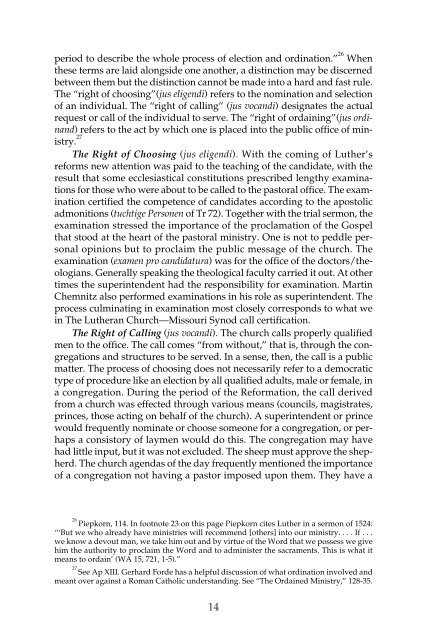45930 Divine Call CTCR final - The Lutheran Church—Missouri Synod
45930 Divine Call CTCR final - The Lutheran Church—Missouri Synod
45930 Divine Call CTCR final - The Lutheran Church—Missouri Synod
You also want an ePaper? Increase the reach of your titles
YUMPU automatically turns print PDFs into web optimized ePapers that Google loves.
period to describe the whole process of election and ordination.” 26 When<br />
these terms are laid alongside one another, a distinction may be discerned<br />
between them but the distinction cannot be made into a hard and fast rule.<br />
<strong>The</strong> “right of choosing”(jus eligendi) refers to the nomination and selection<br />
of an individual. <strong>The</strong> “right of calling” (jus vocandi) designates the actual<br />
request or call of the individual to serve. <strong>The</strong> “right of ordaining”(jus ordinand)<br />
refers to the act by which one is placed into the public office of ministry.<br />
27<br />
<strong>The</strong> Right of Choosing (jus eligendi). With the coming of Luther’s<br />
reforms new attention was paid to the teaching of the candidate, with the<br />
result that some ecclesiastical constitutions prescribed lengthy examinations<br />
for those who were about to be called to the pastoral office. <strong>The</strong> examination<br />
certified the competence of candidates according to the apostolic<br />
admonitions (tuchtige Personen of Tr 72). Together with the trial sermon, the<br />
examination stressed the importance of the proclamation of the Gospel<br />
that stood at the heart of the pastoral ministry. One is not to peddle personal<br />
opinions but to proclaim the public message of the church. <strong>The</strong><br />
examination (examen pro candidatura) was for the office of the doctors/theologians.<br />
Generally speaking the theological faculty carried it out. At other<br />
times the superintendent had the responsibility for examination. Martin<br />
Chemnitz also performed examinations in his role as superintendent. <strong>The</strong><br />
process culminating in examination most closely corresponds to what we<br />
in <strong>The</strong> <strong>Lutheran</strong> <strong>Church—Missouri</strong> <strong>Synod</strong> call certification.<br />
<strong>The</strong> Right of <strong>Call</strong>ing (jus vocandi). <strong>The</strong> church calls properly qualified<br />
men to the office. <strong>The</strong> call comes “from without,” that is, through the congregations<br />
and structures to be served. In a sense, then, the call is a public<br />
matter. <strong>The</strong> process of choosing does not necessarily refer to a democratic<br />
type of procedure like an election by all qualified adults, male or female, in<br />
a congregation. During the period of the Reformation, the call derived<br />
from a church was effected through various means (councils, magistrates,<br />
princes, those acting on behalf of the church). A superintendent or prince<br />
would frequently nominate or choose someone for a congregation, or perhaps<br />
a consistory of laymen would do this. <strong>The</strong> congregation may have<br />
had little input, but it was not excluded. <strong>The</strong> sheep must approve the shepherd.<br />
<strong>The</strong> church agendas of the day frequently mentioned the importance<br />
of a congregation not having a pastor imposed upon them. <strong>The</strong>y have a<br />
26<br />
Piepkorn, 114. In footnote 23 on this page Piepkorn cites Luther in a sermon of 1524:<br />
“‘But we who already have ministries will recommend [others] into our ministry. . . . If . . .<br />
we know a devout man, we take him out and by virtue of the Word that we possess we give<br />
him the authority to proclaim the Word and to administer the sacraments. This is what it<br />
means to ordain’ (WA 15, 721, 1-5).”<br />
27<br />
See Ap XIII. Gerhard Forde has a helpful discussion of what ordination involved and<br />
meant over against a Roman Catholic understanding. See “<strong>The</strong> Ordained Ministry,” 128-35.<br />
14


